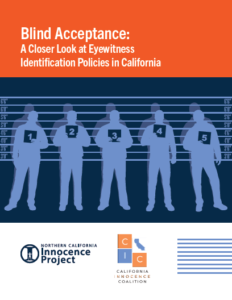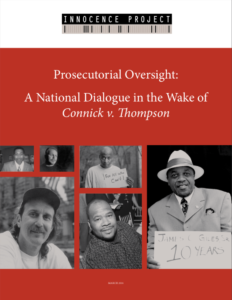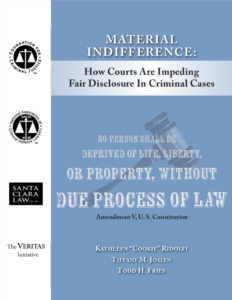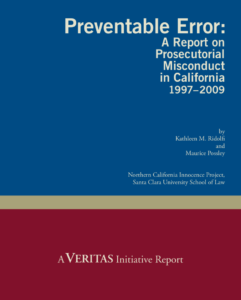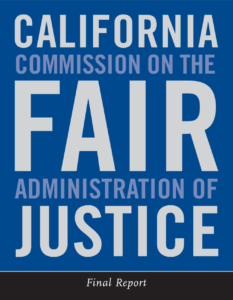NCIP advances the integrity of the criminal legal system through research and data-driven reform. NCIP’s research efforts (formerly conducted under the name VERITAS Initiative) have prompted national dialogue on the fair administration of justice and the critical importance of accountability in the legal system.
BLIND ACCEPTANCE: A CLOSER LOOK AT EYEWITNESS IDENTIFICATION POLICIES IN CALIFORNIA
For nearly four decades, scientists have demonstrated the fragility and malleability of eyewitness memory. In 2018, after years of training and legislative advocacy by the California Innocence Coalition and others, Senator Scott Weiner and Assemblymember Marc Levine authored Senate Bill (SB) 923, requiring all California law enforcement agencies to adopt and implement evidence-based practices in their eyewitness identification procedures. In this study, NCIP sought to answer: 1) To what extent have California police agencies incorporated evidence-based eyewitness identification practices into their policy manuals in compliance with the new law, and 2) How adequate are the written policies of those California police agencies that have adopted evidence-based eyewitness identification practices?
PROSECUTORIAL OVERSIGHT: A NATIONAL DIALOGUE IN THE WAKE OF CONNICK V. THOMPSON
On the fifth anniversary of the U.S. Supreme Court’s decision in Connick v. Thompson, which granted prosecutors broad immunity for their misconduct, NCIP’s VERITAS Initiative and a coalition of innocence organizations released, Prosecutorial Oversight: A National Dialogue in the Wake of Connick v. Thompson, calling for greater transparency and accountability for prosecutors. Although prosecutors have long argued that there are sufficient systems in place to guard against misconduct, NCIP’s VERITAS initiative reviewed court findings of misconduct over a five-year period in five states, documenting 660 findings of misconduct – a likely undercount given the difficulties in identifying this behavior. The report was produced in conjunction with fora featuring a broad array of criminal justice stakeholders in the five states surveyed.
MATERIAL INDIFFERENCE: HOW COURTS ARE IMPEDING FAIR DISCLOSURE IN CRIMINAL CASES
In courtrooms across the nation, accused persons are convicted without ever having seen information that was favorable to their defense. The frequency with which this occurs and the role it plays in wrongful convictions prompted NACDL and NCIP’s VERITAS Initiative to undertake an unprecedented study of Brady claims litigated in federal courts over a five-year period. The Study asked: What role does judicial review play in the disclosure of favorable information to accused? The results revealed a troubling answer—the judiciary is impeding fair disclosure in criminal cases and, in doing so, encouraging prosecutors to disclose as little favorable information as possible.
PREVENTABLE ERROR: A REPORT ON PROSECUTORIAL MISCONDUCT IN CALIFORNIA 1997-2009
A Report on Prosecutorial Misconduct in California 1997–2009 is the most comprehensive, quantitative and actionable study on the extent of prosecutorial misconduct in California, how the justice system identifies and addresses it, and its cost and consequences, including the wrongful conviction of innocent people. By shining a light on prosecutorial conduct, this groundbreaking research, the work of leading experts in the field, served as a catalyst for reform.
CALIFORNIA COMMISSION ON THE FAIR ADMINISTRATION OF JUSTICE (CCFAJ)
NCIP’s research efforts were built upon the work of NCIP Co-Founder and former Executive Director Cookie Ridolfi done on behalf of the California Commission on the Fair Administration of Justice (CCFAJ). As a CCFAJ commissioner, Ridolfi conducted a 10-year study of prosecutorial misconduct in California focusing on the years 1997-2006. This work served as a precursor to NCIP’s “Preventable Error” report, published in 2010, which was co-authored by Professor Ridolfi and Pulitzer Prize-winning journalist, Maurice Possley.

